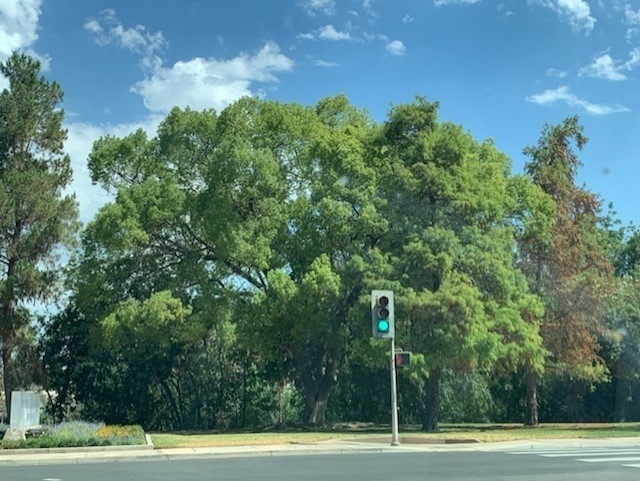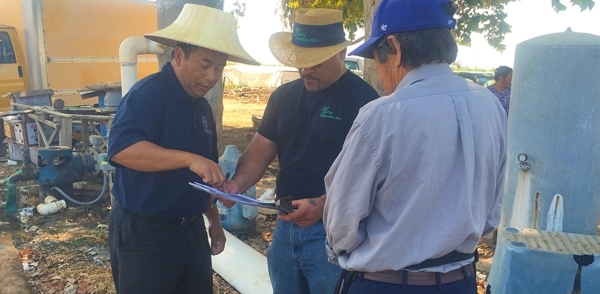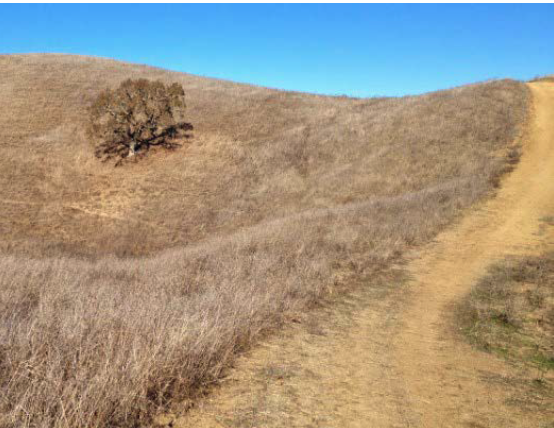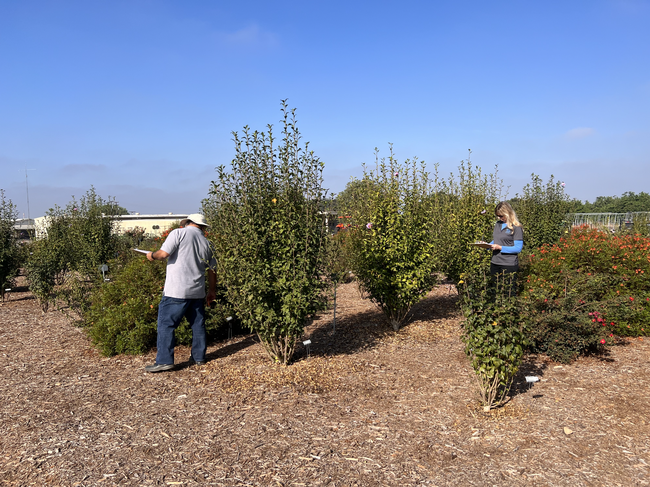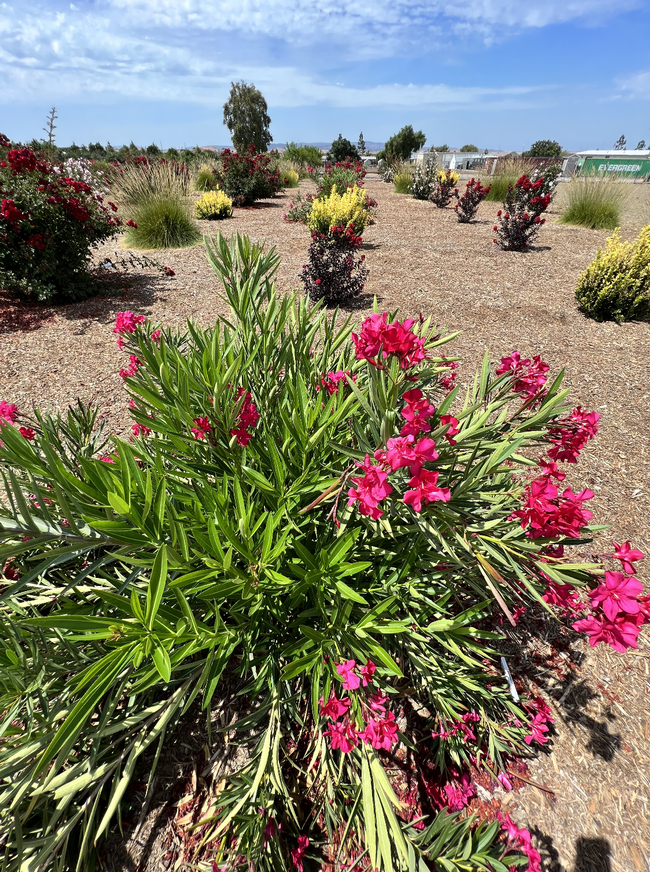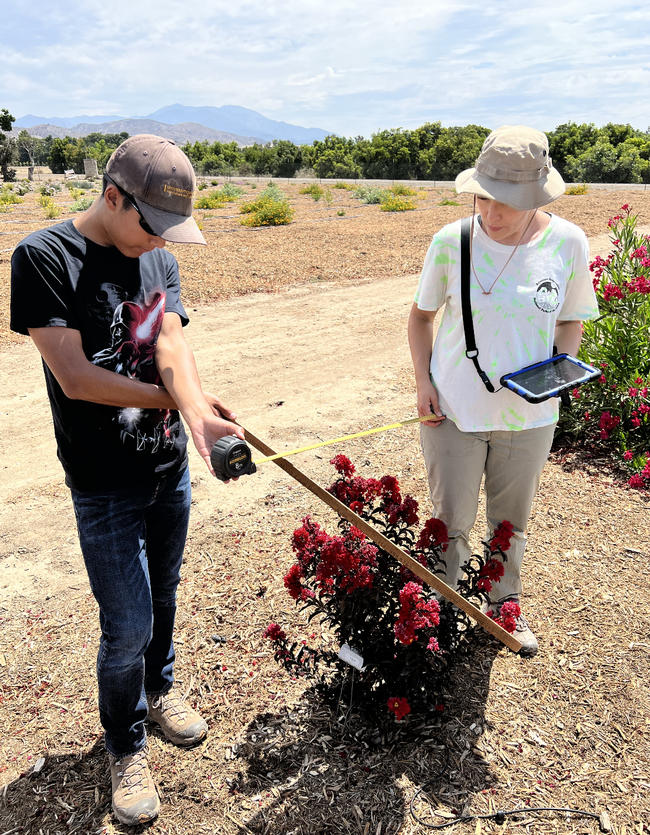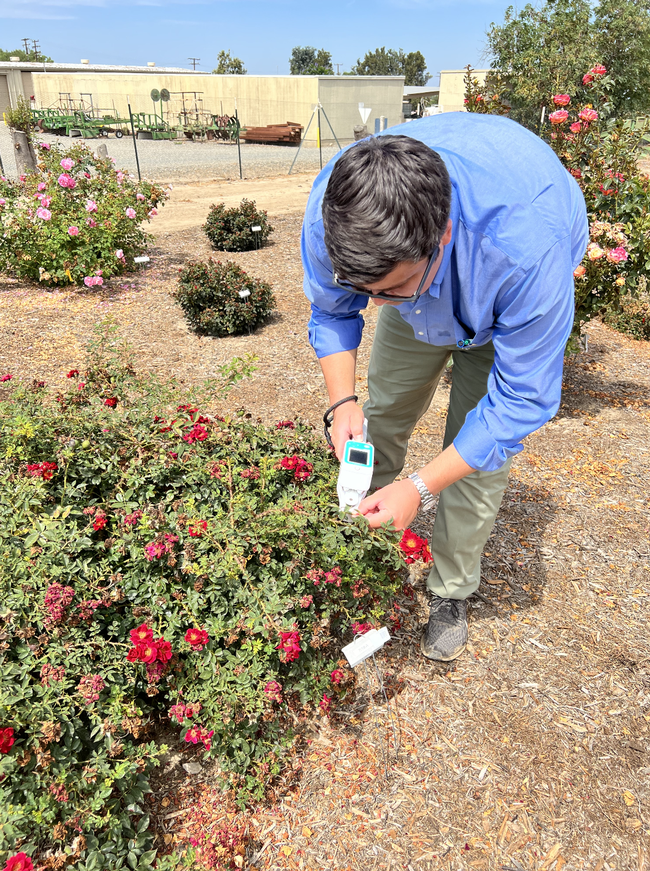Posts Tagged: Ali Hill
Lawn-pocalypse! Surviving Drought
Ah, summer! The season of sunburns, pool parties, and… lawn droughts. If your once lush, green carpet now looks like a crunchy brown doormat, you're not alone. Let's dive into why your yard is staging a dramatic death scene and what you can do to...

Bermuda grass and weeds overtaking drought stressed turf grass.
First Cooperative Extension specialist at UCLA among recent UC ANR hires
The most recent group of scientists and educators hired by University of California Agriculture and Natural Resources includes several firsts, including a UC Cooperative Extension specialist in water equity at UCLA and a UC Cooperative Extension Black, Indigenous and People of Color (BIPOC) community development advisor for the Bay Area.
To better serve Spanish-speaking Californians, UC ANR also added a communication specialist to its News and Information Outreach in Spanish unit.
Officially established in 1914, UC Cooperative Extension's researchers work directly with community members to apply research-based information to improve the lives and livelihoods of Californians. Increased funding from Gov. Gavin Newsom and the state Legislature has enabled UC ANR to expand the number of experts working in communities across the entire breadth of the state, from Siskiyou to San Diego counties.
The newly hired UC Cooperative Extension specialists and advisors bring expertise in nutrition, health impacts of climate change, youth development, dairy science, economics, weed management and pest management.
To see a list of UC Cooperative Extension advisors who have joined in the past few months, visit https://ucanr.edu/About/DirectorySearch/Recent_Hires. The most recently hired scientists are introduced below.
De Guzman named first UCCE specialist at UCLA
Edith de Guzman joined UC ANR Sept. 1 as a UC Cooperative Extension water equity and adaptation policy specialist. She is the first UCCE specialist to be based at UCLA.
Her work investigates best practices for the sustainable transformation of the Los Angeles region and beyond, and has included research, demonstration projects, public policy and planning in the areas of water management, climate adaptation, heat mitigation and urban forestry. She tackles these topics through the lenses of urban planning, public health, behavioral sciences, biophysical sciences and public policy.
She co-founded and directs the Los Angeles Urban Cooling Collaborative, a multisectoral partnership working to alleviate the public health risks of extreme heat. Their research has found that one in four lives currently lost to extreme heat could be saved if L.A.'s land cover had more trees and its built surfaces were more reflective, particularly where low-income communities and communities of color live and work.
From 2014 to 2020, de Guzman served as director of research at the Los Angeles-based organization TreePeople. Her projects at the nonprofit included the City of Los Angeles Stormwater Capture Master Plan; facilitating the creation of a Greening Plan with the Inglewood and Lennox communities; bringing to fruition multiple urban water-management demonstration projects; and leading an extensive study tour of Australia's response to its historic Millennium Drought and gleaning lessons for California. She also produced the first interactive, high-resolution public map and spatial analysis of Los Angeles County's urban forest.
Having completed all of her studies at UCLA, de Guzman holds a Ph.D. in environment and sustainability, a master's degree in urban planning and a bachelor's degree in history and art history.
Learn more about her research advancing climate resilience and access to clean water and sustainable resources in a Q&A at https://innovation.luskin.ucla.edu/2023/07/31/welcome-to-our-new-water-equity-and-adaptation-policy-expert-edith-de-guzman.
De Guzman is based at the UCLA Luskin Center for Innovation in Los Angeles and can be reached at eb3@ucla.edu and @edithbdeguzman on X, formerly known as Twitter.
Murillo-Barrick named BIPOC advisor for Bay Area
Cristina Murillo-Barrick transitioned into a new UCCE position on June 1 as the Black, Indigenous and People of Color (BIPOC) community development advisor serving Alameda, Contra Costa, San Francisco and San Mateo counties.
Murillo-Barrick, who had worked as UCCE academic coordinator focused on planning grants for Fresno, Merced, Madera and Tulare counties since 2021, described her new role as “more holistic,” prioritizing historically marginalized communities. Murillo-Barrick will be identifying opportunities to leverage the strengths of BIPOC communities.
In addition to conducting a needs assessment, Murillo-Barrick is planning to form a language access group at ANR – something she is very passionate about. This group will focus on identifying language barriers and best practices by engaging programs like CalFresh Healthy Living, UC and the Expanded Food and Nutrition Education Program that have expertise conducting multilingual programs throughout California. For example, they may recommend increasing accessibility using infographics and/or video, both of which can be translated into different languages and/or dialects.
The realm of diversity, equity and inclusion is not new to Murillo-Barrick, who has worked in outdoor education spaces, serving historically underserved communities of color. “I worked in DEI before it was considered ‘cool,'” she said.
“I have a lot of influence over program development in this role,” said Murillo-Barrick, who is fluent in Spanish. “So, my goal as an advisor is really focused on the community engagement part,” she added.
Murillo-Barrick earned a master's degree in geography and community development and a bachelor's degree in Spanish and international relations at UC Davis. During graduate school, she studied conservation issues in Nicaragua, as well as in her homeland, Costa Rica.
Murillo-Barrick is based out of the UCCE office in Hayward and can be reached at cmurillo@ucanr.edu.
Cervantes joins UC ANR as broadcast communication specialist
Diana Cervantes joined UC ANR on Sept. 5 as the new broadcast communication specialist for News and Information Outreach in Spanish, or NOS.
Cervantes brings over 25 years of experience as a journalist serving the Spanish-speaking community in Southern California to help fulfill the NOS mission of disseminating information to California's Spanish-speaking community.
Before joining NOS, Cervantes was an editor for El Latino, the most widely circulated Spanish-language newspaper in San Diego County. She participated in the creation of the El Latino website and spearheaded the newspaper's digital platform migration.
Her professional journey includes working as a reporter for La Opinión, the largest Spanish-language daily newspaper in the nation, as well as a reporter for La Prensa/The Press Enterprise in Riverside.
She is bicultural and bilingual, qualities that uniquely equip her to understand the needs and nuances of the immigrant community in this country.
Cervantes holds a bachelor's degree in communication sciences with a minor in written journalism from Universidad Autónoma de Baja California.
"I am very happy for the opportunity to participate in the valuable work that UC ANR does to bring knowledge to the Hispanic community," Cervantes said.
Cervantes is based at the UC ANR office in Riverside and can be reached at diacervantes@ucanr.edu.
Hill named weed science and agronomy advisor
Ryan Hill joined UCCE on Aug. 14 as a weed science and agronomy advisor in Tehama, Shasta and Glenn counties.
In his new role, Hill will be exploring safe and effective weed-management options for a range of cropping systems in the northern Sacramento Valley. He also will be advising on production of agronomic crops to support growers who are looking for ways to diversify their farming operations.
When the UC Master Gardener Program gets established in Tehama County, Hill will provide academic oversight for the local program.
“I have been very fortunate to have a wide background of experience in agricultural research and I intend to draw on that as much as I can as a UCCE advisor,” Hill said. “I also intend to draw on the diverse array of resources and expertise that UC ANR has to offer to support my research and extension programs, as well as the Master Gardener program. I am looking forward to making consistent progress toward more sustainable food systems as a member of the UC ANR team.”
Before joining UC ANR, Hill worked for the Oregon State University Extension Service, the California processing tomato industry, and the Joint Genome Institute. At OSU, he managed research operations and field plantings at the research farm for 3.5 years, while learning weed science. He worked on weed control and herbicide safety projects in hazelnuts, hops, caneberries, cranberries, blueberries, ornamental trees and shrubs, apples, cherries, pears, wine grapes and Christmas trees.
Hill earned a master's degree in plant breeding and genetics from Oregon State University, where he studied the genetics of self-incompatibility in hazelnuts. He earned a bachelor's degree in biology from George Fox University in Newberg, Oregon.
“I was born and raised in Stanislaus County,” Hill said, “and I am happy to be back in the Central Valley after spending the last six years in Oregon.”
Hill is based in Red Bluff and can be reached at rjahill@ucanr.edu.
Branco Lopes joins UCCE as dairy advisor for Tulare, Kern counties
Rúbia Branco Lopes joined UC Cooperative Extension on Aug. 1 as a dairy farm advisor for Tulare and Kern counties.
She is looking forward to working with dairy producers, consultants and allied industry throughout Tulare and Kern counties. Branco Lopes aims to develop a research and outreach program that will contribute to the competitiveness and profitability of California dairies.
Raised on a beef ranch in Brazil, Branco Lopes nurtured an interest in agriculture from an early age.
She came to the U.S. to work as a visiting scholar at the UC Veterinary Medicine Teaching and Research Center in Tulare. At VMTRC, among other projects, she studied the feeding management of close-up rations in California dairies.
Recently, Branco Lopes finished her Ph.D. in animal biology from UC Davis. Her dissertation investigated the effect of probiotics on growth of dairy calves and assessed the safety of commercial cattle probiotic products. During her academic career, she conducted research mainly on ruminant nutrition and antimicrobial stewardship.
She holds a bachelor's degree in agronomy and a master's in animal science from Federal University of Rio Grande do Sul, Brazil.
Branco Lopes is based out of the UC Cooperative Extension office in Tulare and can be reached at rbrancolopes@ucanr.edu.
Vega joins UCCE in San Diego and Orange counties
Liliana Vega is the new UC Cooperative Extension 4-H youth development advisor serving San Diego and Orange counties as of Aug. 1.
Her research and outreach focus on positive youth development through a JEDI (Justice, Equity, Diversity, and Inclusion) lens, STEAM (Science, Technology, Engineering, Arts and Math), youth leadership, outdoor education, and college and career readiness/workforce development programs focused on reaching BIPOC (Black, Indigenous and People of Color) youth and families.
Vega holds a bachelor's degree in multi-ethnic and Mexican American studies from Boise State University and a master's degree in adult/organizational learning and leadership from the University of Idaho.
With over 15 years of experience as a 4-H professional – previously serving San Luis Obispo, Santa Barbara and Ventura counties for the last five years and in Idaho's Ada and Canyon counties before that – Vega feels prepared for her new role as an advisor in San Diego and Orange County.
In 2021, Vega was part of the team that won a Diversity & Inclusion Award from the National Association of Extension 4-H Youth Development Professionals for increasing the number of Latino youths participating in the California 4-H program by more than 250% over three years.
“I'm excited to forge new partnerships in San Diego and Orange counties and collaboratively work to provide access to experiential learning, increase youth-adult partnerships, and help youth gain the support they need to grow and thrive as individuals,” she said.
Vega has extensive experience in forming community partnerships to deliver quality youth development programs, with a focus on increasing access for minority, low-income and underserved audiences. Her expertise is in culturally adapting programs for the Latinx community.
Currently, Vega serves on the National 4-H LGBTQ+ and Immigrant/Refugee Youth and Community Champion Groups. She also chairs the 4-H Statewide JEDI Advisory Committee, California 4-H True Leaders in Equity Youth Taskforce, and UC Agriculture and Natural Resources' Career/College Readiness and Workforce Development Workgroup.
Vega is based at the UCCE office in San Diego and can be reached at live@ucanr.edu.
Ramirez Bonilla named pesticide-safety education program coordinator
Jasmin Ramirez Bonilla joined the UC Statewide Integrated Pest Management Program on July 10 as a pesticide-safety education program coordinator. She is working on projects promoting pesticide safety.
Prior to joining UC ANR, she worked for the CDFA Plant Pest Diagnostics Branch as a lab technician for the molecular lab, analyzing and processing crop samples for nematode identification.
Ramirez Bonilla earned a master's degree in entomology from UC Davis and bachelor's degree in Earth systems science from UC Merced. At UC Davis, she worked under the supervision of Ian Grettenberger, UCCE specialist, on IPM in forages and vegetable crops. For her thesis, Ramirez Bonilla researched the efficacy of an experimental aggregation pheromone for the management of cucumber beetles, key pests of fresh market melons in California.
Ramirez Bonilla is based at the ANR building in Davis and can be reached at jramirezbonilla@ucanr.edu.
Van Cleave-Hunt named UCCE nutrition, health and food security advisor
Veronica Van Cleave-Hunt began a new position within UC ANR on July 5 as the UC Cooperative Extension community nutrition, health and food security advisor serving Butte, Colusa, Glenn, Sutter and Yuba counties.
Before beginning her current position, Van Cleave-Hunt served for four years as a community education specialist for the CalFresh Healthy Living, UC program before becoming the program supervisor serving the same counties.
“Luckily, I already have my finger on the pulse of the community in these five counties just through my experience with CalFresh. I've been able to build rapport and connections with a lot of community partners and stakeholders,” said Van Cleave-Hunt.
As an advisor, Van Cleave-Hunt will focus on nutrition, education and healthy living efforts for people who are at a disadvantage, for example, those living in food deserts or experiencing food insecurity, a term used to describe the societal and environmental barriers to access and manage food.
“Food security is about environment and access, but also skills related to food,” Van Cleave-Hunt said. “For instance, budgeting, even things like gardening, cooking and knowing how to prepare food so that you don't always have to buy ready-made food, or how to store things properly so that they last as long as possible.”
According to Van Cleave-Hunt, food security includes skills that will help you get the most out of the food that you have.
Currently, Van Cleave-Hunt is compiling secondary data to conduct a needs assessment. In addition to engaging stakeholders such as resident service coordinators at low-income housing units or community organizations, she is also working with the State Council on Developmental Disabilities to develop healthy living trainings and curricula that will benefit communities in her counties.
Van Cleave-Hunt said that her time with UC Cooperative Extension has been a “full-circle journey” since she studied human behavior and health in school. She started her undergraduate career at Santa Rosa Junior College before transferring to California State University, Chico where she earned a bachelor's in nutrition and a master's degree in nutrition education.
Chelsey Slattery, former UCCE area nutrition, family, and consumer sciences advisor for Butte County, recruited Van Cleave-Hunt right out of college to be a UC Cooperative Extension community education specialist. Today, Van Cleave-Hunt holds the position that Slattery once did.
Van Cleave-Hunt can be reached at vvancleavehunt@ucanr.edu and is based in Oroville.
Wayne joins UCCE as food systems advisor
Laurie Wayne joined UC Cooperative Extension on July 5 in Modoc County as a nutrition and food systems advisor for Modoc, Lassen and Siskiyou counties. Wayne will work with community members on healthy lifestyles, nutrition, food access and security, local food production, preservation and availability.
Wayne brings years of high-desert food systems experience to her role: she owned and operated Locavore Farms in Fort Bidwell, helped found the Surprise Valley Saturday Market and Modoc Harvest, and was on the team that started the Modoc Harvest Food Hub. She also has worked supporting healthy communities for Oregon State University Extension in Klamath Falls, and at the High Desert Food and Farm Alliance in Bend, Oregon.
She earned a master's degree in TESOL (to teach English as a second language) from Portland State University and worked in school and community gardens with immigrants and refugees as part of her research project. She earned a bachelor's degree in Italian literature from UC Santa Cruz.
This job feels like the culmination of the farming, studying, supporting farmers and working in food systems she has done in the past 15 years, Wayne said.
“I'm especially interested in working on expanding access to affordable, healthy, local food year-round, including extending and preserving the harvest,” Wayne said. Her goal is to help everyone feel empowered to make healthy food choices, and she's learning what resources producers need to improve processing, transportation and production strategies, and overcome barriers that are unique to the region.
To better understand both the food systems needs and the abundant food assets of northeastern California, she will be meeting with community members; state, local and regional nonprofits; schools and other organizations in the next few months. They will discuss ways to strengthen community food system resilience.
“It's all about healthy community members who can eat good local food without breaking the bank, and producers who can make a living feeding them,” Wayne said.
Based in Alturas, Wayne can be reached at lwayne@ucanr.edu and (530) 233-6400.
Hyland named UCCE environmental health sciences specialist
Carly Hyland joined UC ANR in July as a UC assistant Cooperative Extension environmental health sciences specialist and assistant professor in the UC Berkeley School of Public Health.
She recently finished a mixed-methods project at Boise State University examining pesticide exposure and perceptions of the risks of pesticides among Latino men and women farmworkers in Idaho. In California, she is pursuing projects examining interventions to protect farmworkers from pesticides, extreme heat and wildfire smoke in collaboration with community partners.
“There are so many reasons I wanted to come back to Berkeley, and I think one of the biggest motivating factors for me was the collaborative environment focused not just on conducting innovative research, but also translating those findings into solutions to improve community health,” Hyland said. “Farmworkers are increasingly experiencing the health impacts of climate change on a daily basis, and this position will provide me with the resources and collaborations necessary to identify strategies to address these urgent issues.”
Hyland earned her Ph.D. in environmental health sciences and master's degree in global health and the environment, both from UC Berkeley, and bachelor's degree in environmental science from Carthage College in Wisconsin.
Hyland is based at UC Berkeley and can be reached at chyland@berkeley.edu and on X (formerly Twitter) @c_hyland1.
Smith-Helman joins Climate Smart Agriculture Program
Bailey Smith-Helman joined UCCE Santa Cruz County on July 3 as a community education specialist with the UC ANR Climate Smart Agriculture Program.
Smith-Helman, who relocated from Washington, D.C., is excited to get back in the field and support Santa Cruz County growers with climate-smart agriculture practices and California Department of Food and Agriculture financial incentive programs.
CDFA programs provide financial incentives to eligible farmers and ranchers implementing new practices that maximize water efficiency, build soil health, and improve manure management. She is ready to assist interested growers with grant applications, project planning and implementation.
After graduating from Northwestern University with a bachelor's degree in political science and environmental policy, Smith-Helman moved to Paraguay to serve as an agriculture volunteer with the Peace Corps. In Paraguay, she worked closely with agricultural educators and local producers to develop education plans and lessons to engage high school students in agricultural coursework.
After returning to the U.S., Smith-Helman worked for USDA Supplemental Nutrition Assistance Program, where she gained experience in agriculture policy analysis and program management.
Smith-Helman is based in Watsonville and can be reached at bsmithhelman@ucanr.edu.
Sayre named UCCE agriculture and resource economics specialist
James “Jay” Sayre joined UC Cooperative Extension and the UC Davis Department of Agriculture and Resource Economics as a CE Specialist on July 1.
His role focuses on the economics of food supply chains across the state of California. Sayre aims to study policies to promote greater competition in food supply chains to benefit smaller-scale producers, understand the role of international trade in agriculture and its effects on Californian consumers, and assess how supply chains can best respond to a changing climate.
Sayre is excited about combining economic theory and modeling approaches with understanding the needs of stakeholders in California to benefit food supply chains within California.
Sayre earned a doctorate in Agricultural and Resource Economics at UC Berkeley. His dissertation research spanned several disciplines, with chapters seeking to understand how agricultural supply chains lead regions to specialize in certain crops, the consequences of phytosanitary and other non-tariff barriers to trade, as well as developing methodology to accurately assess crop yields across large regions using satellite imagery and other sources of publicly available data. He earned a bachelor's degree in economics and mathematics from the University of Minnesota-Twin Cities.
The Colorado native is looking forward to addressing a variety of issues relevant to California stakeholders. An ongoing project looks to develop fine-scale projections of future agricultural productivity for most of the major crops California produces, including crops that have historically not had such measures available, like perennials such as almonds, avocados and other fruits.
He hopes such information will be relevant not only for growers seeking to understand whether their land will be relatively more suitable in the future for different crops, but also agricultural intermediaries and policy makers looking to understand where production of certain crops may shift in the future.
Before joining Cooperative Extension and UC Davis, Sayre worked in Mexico, seeking to better understand the cross-border nature of supply chains that operate in both California and Mexico. He is proficient in Spanish and aims to increase the accessibility of extension to Spanish speakers.
Sayre is based out of the Department of Agriculture and Resource Economics at UC Davis and can be reached at jsayre@ucdavis.edu.
Valliere joins UCCE as weed and restoration ecology specialist
Justin Valliere joined UC ANR on July 1 as an assistant professor of Cooperative Extension in invasive weed and restoration ecology at UC Davis.
Valliere's research aims to evaluate how human-caused environmental change and invasive plant species impact native ecosystems, and how we can reverse this degradation through ecological restoration. The overarching goal of his research and outreach is to develop real-world solutions for land management in the face of global change.
“CE already is such an effective system for supporting agriculture, but it's also an important model for natural resource management and restoration,” Valliere told Trina Kleist, writer for the UC Davis Department of Plant Sciences. “There is a real need for help advising folks throughout the state about managing and restoring natural lands, and I'm excited to help bolster that.”
Prior to joining UC Davis, Valliere was an assistant professor of biology at CSU Dominguez Hills, a research fellow at the University of Western Australia, and a postdoctoral fellow at the La Kretz Center for California Conservation Science at UCLA.
Valliere earned his Ph.D. in plant biology from UC Riverside, and a bachelor's degree in biology from Green Mountain College in Poultney, Vermont.
Valliere is based in the Department of Plant Sciences at UC Davis and can be reached at jmvalliere@ucdavis.edu.
Hill named UCCE specialist in diversity and equity economics
Alexandra “Ali” Estvan Hill joined UC ANR and UC Berkeley's Department of Agricultural and Resources Economics on July 1 as an assistant professor of Cooperative Extension specializing in the economics of diversity and equity.
From 2019 until she joined UC, Hill worked as an assistant professor of agricultural economics at Colorado State University. Her research centers around the U.S. agricultural workforce and seeks to demonstrate how a variety of factors impact worker well-being, quantified in terms of income or health impacts – and to make a business case for employers, in terms of implications for production or profits, to institute policies and practices that promote worker well-being.
Hired farmworkers contribute greatly to the racial, ethnic, cultural and socioeconomic diversity of U.S. agriculture; however, they are frequently not treated equitably and face a multitude of economic, physical, legal and emotional hardships in their personal and professional lives. Hill's research seeks to begin dismantling these inequities by finding avenues through which employers can increase worker well-being while maintaining or increasing profits.
Hill brings extensive experience working with individual agricultural businesses to accomplish these objectives through enhancing firm data collection and analysis to provide an array of effective, efficient and actionable insights.
She is building an extension program centered around advancing diversity, equity, inclusion and belonging in the agri-food system by enhancing the well-being of agricultural employees and other disadvantaged members of rural and urban agricultural communities.
She earned her Ph.D. in agricultural and resource economics from UC Davis and master's degree in agricultural and applied economics and bachelor's degree in agricultural and consumer economics from University of Illinois, Urbana-Champaign.
Hill is based at UC Berkeley and can be reached at alihill@berkeley.edu and on LinkedIn www.linkedin.com/in/alexandra-estvan-hill.
Climate-Change Resources
University of California UC ANR Green Blog (Climate Change and Other Topics) https://ucanr.edu/blogs/Green/index.cfm?tagname=climate%20change (full index)
Examples:
- Save Trees First: Tips to Keep Them Alive Under Drought https://ucanr.edu/b/~CdD
- Landscaping with Fire Exposure in Mind: https://ucanr.edu/b/~G4D
- Cities in California Inland Areas Must Make Street Tree Changes to adapt to Future Climate https://ucanr.edu/b/~oF7
Drought, Climate Change and California Water Management Ted Grantham, UC Cooperative Extension specialist (23 minutes) https://youtu.be/dlimj75Wn9Q
Climate Variability and Change: Trends and Impacts on CA Agriculture Tapan Pathak, UC Cooperative Extension specialist (24 minutes) https://youtu.be/bIHI0yqqQJc
California Institute for Water Resources (links to blogs, talks, podcasts, water experts, etc.) https://ciwr.ucanr.edu/California_Drought_Expertise/
UC ANR Wildfire Resources (publications, videos, etc.) https://ucanr.edu/News/For_the_media/Press_kits/Wildfire/ (main website)
-UC ANR Fire Resources and Information https://ucanr.edu/sites/fire/ (main website)
-Preparing Home Landscaping https://ucanr.edu/sites/fire/Prepare/Landscaping/
UC ANR Free Publications https://anrcatalog.ucanr.edu/ (main website)
- Benefits of Plants to Humans and Urban Ecosystems: https://anrcatalog.ucanr.edu/pdf/8726.pdf
-Keeping Plants Alive Under Drought and Water Restrictions (English version) https://anrcatalog.ucanr.edu/pdf/8553.pdf
(Spanish version) https://anrcatalog.ucanr.edu/pdf/8628.pdf
- Use of Graywater in Urban Landscapes https://anrcatalog.ucanr.edu/pdf/8536.pdf
- Sustainable Landscaping in California https://anrcatalog.ucanr.edu/pdf/8504.pdf
Other (Non-UC) Climate Change Resources
Urban Forests and Climate Change. Urban forests play an important role in climate change mitigation and adaptation. Active stewardship of a community's forestry assets can strengthen local resilience to climate change while creating more sustainable and desirable places to live. https://www.fs.usda.gov/ccrc/topics/urban-forests
Examining the Viability of Planting Trees to Mitigate Climate Change (plausible at the forest level) https://climate.nasa.gov/news/2927/examining-the-viability-of-planting-trees-to-help-mitigate-climate-change/
Reports and other information resources coordinated under the auspices of the United Nations and produced through the collaboration of thousands of international scientists to provide a clear and up to date view of the current state of scientific knowledge relevant to climate change. United Nations Climate Action
Scientific reports, programs, action movements and events related to climate change. National Center for Atmospheric Research (National Science Foundation)
Find useful reports, program information and other documents resulting from federally funded research and development into the behavior of the atmosphere and related physical, biological and social systems. Search and find climate data from prehistory through to an hour ago in the world's largest climate data archive. (Formerly the "Climatic Data Center") National Centers for Environmental Information (NOAA)
Think tank providing information, analysis, policy and solution development for addressing climate change and energy issues (formerly known as the: "Pew Center on Global Climate Change"). Center for Climate & Energy Solutions (C2ES)
Mapping Resilience: A Blueprint for Thriving in the Face of Climate Disaster. The Climate Adaptation Knowledge Exchange (CAKE) was launched in July 2010 and is managed by EcoAdapt, a non-profit with a singular mission: to create a robust future in the face of climate change by bringing together diverse players to reshape planning and management in response to rapid climate change. https://www.cakex.org/documents/mapping-resilience-blueprint-thriving-face-climate-disaster
Cal-Adapt provides a way to explore peer-reviewed data that portrays how climate change might affect California at the state and local level. We make this data available through downloads, visualizations, and the Cal-Adapt API for your research, outreach, and adaptation planning needs. Cal-Adapt is a collaboration between state agency funding programs, university and private sector researchers https://cal-adapt.org/
Find reports, maps, data and other resources produced through a confederation of the research arms of 13 Federal departments and agencies that carry out research and develop and maintain capabilities that support the Nation's response to global change. Global Change (U.S. Global Change Research Program)
The Pacific Institute is a global water think tank that combines science-based thought leadership with active outreach to influence local, national, and international efforts to develop sustainable water policies. https://pacinst.org/our-approach/
Making equity real in climate adaptation and community resilience policies and programs: a guidebook. https://greenlining.org/publications/2019/making-equity-real-in-climate-adaption-and-community-resilience-policies-and-programs-a-guidebook/
Quarterly CA Climate Updates and CA Drought Monitor Maps (updated each Thursday) https://www.drought.gov/documents/quarterly-climate-impacts-and-outlook-western-region-june-2022
Drought focus of Water Resources IMPACT magazine special issue
UC ANR experts address emotional toll of drought
Preparing the American West for prolonged drought is the focus of a double issue of Water Resources IMPACT magazine. The California Water Commission staff are guest editors for this special open-access edition of the magazine, which is published by the American Water Resources Association.
Faith Kearns, academic coordinator of University of California Agriculture and Natural Resources' California Institute for Water Resources, is among the authors delving into how drought impacts people and the environment and how we can better prepare for the inevitable.
The first issue, published on Feb. 14, focuses on water scarcity issues confronting California and the ways these issues affect different sectors.
In “Trauma, Care, and Solidarity: Addressing the Emotional Toll of Chronic Drought,” Kearns highlights the effects of drought on mental health. She points to the spike in suicide hotline calls when wells ran dry in Southeast Asian communities in California's Central Valley.
By listening to Southeast Asian farmers, Ruth Dahlquist-Willard and Michael Yang of UC Cooperative Extension were able to “lighten the load” for them by providing pragmatic support, Kearns writes.
“The scale of some of these highly emotional issues – drought, wildfires, climate change – can make them seem incredibly difficult, if not impossible, to deal with,” Kearns said. “At the same time, they are affecting everyone living in the western U.S. on a daily basis. I wanted to highlight and provide models based on work that people – whether they are researchers, clinical psychologists, or Cooperative Extension advisors – are doing right now to ease the way.”
The authors who contributed to the double issue are a diverse array of Tribal experts, academics, nongovernmental organization thought-leaders, water managers and water policy influencers, each of whom brings their own perspective on the topic of drought. Their expertise and perspectives in climate science, water policy and water management will help inform drought-related decision-making and support policies that better prepare the state to thrive during periods of prolonged water scarcity.
In addition to Kearns, the first issue includes articles contributed by:
- Samantha Stevenson, University of California, Santa Barbara
- Jay Lund, University of California, Davis
- Ron Goode, North Fork Mono Tribe
- Andy Fecko, Placer County Water Agency
- Jeff Mount, Public Policy Institute of California, and Ted Grantham, University of California, Berkeley/UC Cooperative Extension
- Nat Seavy and Karyn Stockdale, National Audubon Society
- Kjia Rivers, Community Water Center
- Cannon Michael, Bowles Farming
- Michelle Reimers, Turlock Irrigation District
The January/February edition of Water Resources IMPACT magazine can be accessed, free of charge, on the American Water Resources Association website at https://www.awra.org under “Publications.”
The second issue, to be published in March, will focus on drought response, considering the options for adaptation. This two-part series complements the Commission's work on strategies to protect communities and fish and wildlife in the event of a long-term drought.
Your water-efficient landscape doesn’t have to be barren
UC climate-ready landscape trials identify low-water yet attractive plants
Good news: roses can be a part of your water-efficient landscape. Lorence Oki, UC Cooperative Extension environmental horticulture specialist in the UC Davis Department of Plant Sciences, identified rose cultivars that remain aesthetically pleasing with little water.
Oki is the principal investigator of the Climate-Ready Landscape Plants project, which may be the largest irrigation trial in the western U.S., and the UC Plant Landscape Irrigation Trials (UCLPIT), the California component of that project. These projects evaluate landscape plants under varying irrigation levels to determine their optimal performance in regions requiring supplemental summer water.
“There are some assumptions that pretty plants use a lot of water, like roses,” Oki said. “Everyone thinks they need a lot of water, but we've found some that don't, and they still look great. A water-efficient landscape doesn't need to look like a Central Valley oak-grassland in the summer. It can look really attractive.”
In 2021, Oki's team at UC Davis identified Lomandra confertifolia ssp. pallida "Pom Pom" Shorty and Rosa "Sprogreatpink" Brick House® Pink as two of the best low-water plants in the trial.
“The useful tip or information that is shared at the end of each trial is the selection and designation of plants as Blue Ribbon winners. These are the plants that looked good with an overall rating of 4 or higher throughout and were on the low (20%) water treatment,” said Natalie Levy, associate specialist for water resources, who manages the project at the UC ANR South Coast Research and Extension Center.
How plants earn a blue ribbon
Each trial year, the selection of new plants is based on research recommendations and donated submissions from the nursery industry. The landscape plants are trialed in full sun or 50% shade cover.
Irrigation treatments are based on the rate of evaporation and plant transpiration (evapotranspiration) measured through a local California Irrigation Management Information System (CIMIS) weather station that provides a reference evapotranspiration (ETo) rate.
Three levels of irrigation are provided to the plants equal to 20%, 50%, and 80% of ETo. The volume of water applied is the same at each irrigation based on soil characteristics, but the interval between applications varies with weather and the treatment. Using this method, irrigations for the 20% treatment are less frequent than the 80% treatment.
“The 20% treatment during the 2022 trial was irrigated an average of once per month while the 80% treatment was irrigated weekly,” explained Levy.
During the deficit irrigation trial, monthly height and width measurements are taken to determine the plant growth index. Monthly qualitative aesthetic ratings on a scale of 1 to 5 are determined for foliage appearance, flowering abundance, pest tolerance, disease resistance, vigor and overall appearance.
A second round of flowering abundance and overall appearance measurements are also taken to capture more of the blooming period. For example, UCLPIT identified in the 2020 trial at South Coast REC that the "Apricot Drift" rose had a mean overall appearance score of 3.5 out of 5, deeming it “acceptable to very nice” and a low water use plant within the Water Use Classification of Landscape Species or WUCOLS guide.
Project expands options for landscape planting
“(WUCOLS) only has 3,500 plants in it. There are guesses that there are close to 10,000 cultivars in urban landscapes in California, if not more,” said Oki. “WUCOLS also didn't have numerical ratings. Instead, you'll see verbal ratings like ‘low water use' or ‘high water use.'”
The UCLPIT project has not only developed numerical recommendations for irrigation, but it has also added new landscape plants that are compliant with California's Model Water Efficient Landscape Ordinance. In fact, UCLPIT's data is one of the few sources that can be used to supplement WUCOLS.
Geographic diversity of trial sites adds to knowledge base
In addition to UC Davis and South Coast REC in Irvine, the trials have expanded beyond California as the Climate-Ready Landscape Plants project and is in progress at Oregon State University, University of Washington, University of Arizona and Utah State University thanks to a USDA/CDFA grant awarded in 2020.
Lloyd Nackley, associate professor of nursery production and greenhouse management at Oregon State University, is the principal investigator of the trial in the Portland metro area, which is entering its third year.
“People know that there are drought tolerant plants, but there are many. We're trying to highlight lesser known or newer varieties. And even though the trial is three years, most gardeners would hope that their garden lasts longer than that,” said Nackley.
One of the observations that Nackley recalls is of the Hibiscus Purple Pillar plant. Unlike the trial at South Coast, the Purple Pillar did not perform well in Oregon in the spring.
“It wasn't until August that we saw the plant bloom and begin to look like what we saw from South Coast in April,” Nackley said.
Ursula Schuch, horticulture professor and principal investigator of the trial taking place at the University of Arizona, was also surprised at the range of performance among different plant types and the effects of irrigation, heat and temperature.
“This research will reassure green industry professionals that they can stretch their water budget to successfully cultivate more plants, watering them according to their needs instead of irrigating every plant according to the highest water-using plants,” said Schuch.
Although research is only conducted in the West, the hope is that there will be trials in other regions of U.S.
Doing so would yield comprehensive information about the plants and their performance in different climates. As extreme weather events persist in the U.S., disease pressure and risks do too. Trials throughout the country would provide location-specific data regarding disease susceptibility.
To learn more about the UCLPIT research project, visit https://ucanr.edu/sites/UCLPIT/















